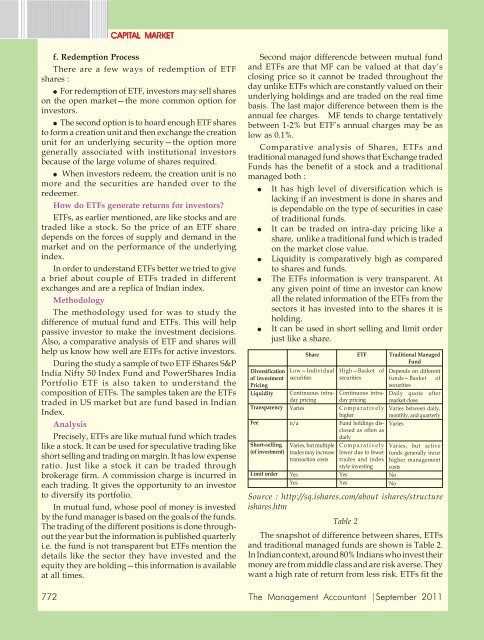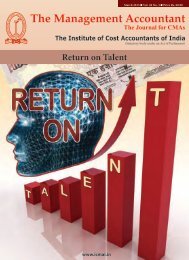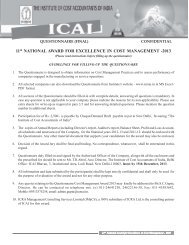This Issue - Icwai
This Issue - Icwai
This Issue - Icwai
Create successful ePaper yourself
Turn your PDF publications into a flip-book with our unique Google optimized e-Paper software.
CAPITAL CAPITAL MARKET<br />
MARKET<br />
f. Redemption Process<br />
There are a few ways of redemption of ETF<br />
shares :<br />
● For redemption of ETF, investors may sell shares<br />
on the open market—the more common option for<br />
investors.<br />
● The second option is to hoard enough ETF shares<br />
to form a creation unit and then exchange the creation<br />
unit for an underlying security—the option more<br />
generally associated with institutional investors<br />
because of the large volume of shares required.<br />
● When investors redeem, the creation unit is no<br />
more and the securities are handed over to the<br />
redeemer.<br />
How do ETFs generate returns for investors?<br />
ETFs, as earlier mentioned, are like stocks and are<br />
traded like a stock. So the price of an ETF share<br />
depends on the forces of supply and demand in the<br />
market and on the performance of the underlying<br />
index.<br />
In order to understand ETFs better we tried to give<br />
a brief about couple of ETFs traded in different<br />
exchanges and are a replica of Indian index.<br />
Methodology<br />
The methodology used for was to study the<br />
difference of mutual fund and ETFs. <strong>This</strong> will help<br />
passive investor to make the investment decisions.<br />
Also, a comparative analysis of ETF and shares will<br />
help us know how well are ETFs for active investors.<br />
During the study a sample of two ETF iShares S&P<br />
India Nifty 50 Index Fund and PowerShares India<br />
Portfolio ETF is also taken to understand the<br />
composition of ETFs. The samples taken are the ETFs<br />
traded in US market but are fund based in Indian<br />
Index.<br />
Analysis<br />
Precisely, ETFs are like mutual fund which trades<br />
like a stock. It can be used for speculative trading like<br />
short selling and trading on margin. It has low expense<br />
ratio. Just like a stock it can be traded through<br />
brokerage firm. A commission charge is incurred in<br />
each trading. It gives the opportunity to an investor<br />
to diversify its portfolio.<br />
In mutual fund, whose pool of money is invested<br />
by the fund manager is based on the goals of the funds.<br />
The trading of the different positions is done throughout<br />
the year but the information is published quarterly<br />
i.e. the fund is not transparent but ETFs mention the<br />
details like the sector they have invested and the<br />
equity they are holding—this information is available<br />
at all times.<br />
Second major differencde between mutual fund<br />
and ETFs are that MF can be valued at that day’s<br />
closing price so it cannot be traded throughout the<br />
day unlike ETFs which are constantly valued on their<br />
underlying holdings and are traded on the real time<br />
basis. The last major difference between them is the<br />
annual fee charges. MF tends to charge tentatively<br />
between 1-2% but ETF’s annual charges may be as<br />
low as 0.1%.<br />
Comparative analysis of Shares, ETFs and<br />
traditional managed fund shows that Exchange traded<br />
Funds has the benefit of a stock and a traditional<br />
managed both :<br />
● It has high level of diversification which is<br />
lacking if an investment is done in shares and<br />
is dependable on the type of securities in case<br />
of traditional funds.<br />
● It can be traded on intra-day pricing like a<br />
share, unlike a traditional fund which is traded<br />
on the market close value.<br />
● Liquidity is comparatively high as compared<br />
to shares and funds.<br />
● The ETFs information is very transparent. At<br />
any given point of time an investor can know<br />
all the related information of the ETFs from the<br />
sectors it has invested into to the shares it is<br />
holding.<br />
● It can be used in short selling and limit order<br />
just like a share.<br />
Diversification<br />
of investment<br />
Pricing<br />
Liquidity<br />
Transparency<br />
772 The Management Accountant |September 2011<br />
Fee<br />
Short-selling<br />
(of investment)<br />
Limit order<br />
Share<br />
Low—Individual<br />
securities<br />
Continuous intraday<br />
pricing<br />
Varies<br />
n/a<br />
Varies, but multiple<br />
trades may increase<br />
transaction costs<br />
Yes<br />
Yes<br />
ETF<br />
High—Basket of<br />
securities<br />
Continuous intraday<br />
pricing<br />
Comparatively<br />
higher<br />
Fund holdings disclosed<br />
as often as<br />
daily<br />
Comparatively<br />
lower due to fewer<br />
trades and index<br />
style investing<br />
Yes<br />
Yes<br />
Traditional Managed<br />
Fund<br />
Depends on different<br />
funds—Basket of<br />
securities<br />
Daily quote after<br />
market close<br />
Varies between daily,<br />
monthly, and quarterly<br />
Varies<br />
Varies, but active<br />
funds generally incur<br />
higher management<br />
costs<br />
No<br />
No<br />
Source : http://sq.ishares.com/about ishares/structure<br />
ishares.htm<br />
Table 2<br />
The snapshot of difference between shares, ETFs<br />
and traditional managed funds are shown is Table 2.<br />
In Indian context, around 80% Indians who invest their<br />
money are from middle class and are risk averse. They<br />
want a high rate of return from less risk. ETFs fit the




